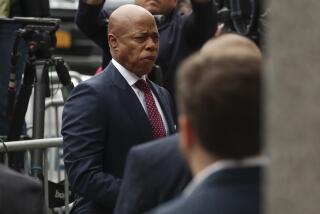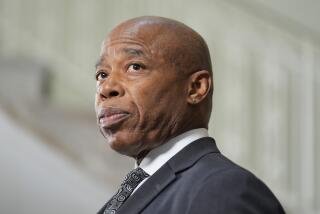If He Can’t Respect Office, Why Stay? : Meese May Escape Allegations, but Actions are Unthinkable
It is remarkable that Edwin Meese III was ever appointed attorney general or that, once appointed, he has not been forced to resign.
Recall Meese’s inauspicious beginning. It required almost a year before his nomination could be brought to the Senate for confirmation. The delay was due to independent counsel Jacob Stein’s investigation of (among other things) Meese’s use of his prior position as President Reagan’s counselor to obtain government jobs for persons who had lent money or done other financial favors for Meese.
Stein concluded that while there was insufficient evidence on which to indict Meese, there was evidence of “an amazing sloppiness about his personal financial affairs, a casual disregard for what most regarded as serious and important disclosure laws to maintain the integrity of government, and a curious blindness to the way such dealings would look to those who weren’t his friends and cronies.”
Meese’s history since then is remarkable in the number and variety of scandals in which he has been embroiled. Recall: That Meese openly intervened in obtaining defense contracts for Wedtech on just the recommendation of his friend and personal attorney, E. Robert Wallach; that although Meese himself received no money from Wedtech, Wallach has been accused of receiving more than $2 million in money and securities from Wedtech to influence Meese; that in 1985 Meese invested with a company managed by a Wedtech director, which investments yielded high profits on stock trades apparently involving more money than Meese had in his account; that Meese on his own declared this investment to be a “blind trust” without complying with the Ethics in Government Act, and as a result failed to disclose the nature of the securities for purposes of conflict-of-interest review; that Meese participated in a Justice Department decision allowing regional phone companies to expand into information services, despite his ownership of stock in certain phone companies.
Given this history, the disclosures about Meese’s involvement--and possible financial gain--in an unsuccessful effort by Wallach to obtain U.S. support for an Iraqi pipeline are not surprising. What is surprising is that the nation’s chief law-enforcement officer should receive a memorandum suggesting possibly illegal payments to Israeli officials and do nothing about it.
It may well be that through all of these scandals Meese can truthfully say, in Richard M. Nixon’s famous phrase, that he is not a crook. It may also be that Meese may escape indictment. But there are many forms of impropriety that do not involve stealing money or being indicted. Allowing the powers of office to be used in ways that enrich your friends, carelessly disregarding conflict-of-interest guidelines and disclosure requirements, and ignoring suggestions of bribery when made by long-term friends each qualifies as enough impropriety to bring down a government official. When the official is the attorney general--the person who by his conduct and advice should set the ethical standard for personal behavior within an administration--the retention of office is unthinkable.
Distinct from the issue of personal ethics is the disrespect that Meese has shown for the unique office that he holds. The attorney general is the nation’s highest law enforcement official, and he heads the department charged with upholding the Constitution and federal laws. It is his responsibility to ensure that the law is applied impartially and without regard for the position, power or party of the individuals involved.
Meese’s use of his office falls well below these responsibilities. Consider: That as soon as Meese was in office he launched a series of attacks not only on specific decisions of the U. S. Supreme Court like Roe vs. Wade, Miranda and First Amendment establishment cases, but also on the very doctrine that the Supreme Court interpretations of the Constitution are authoritative as part of the supreme law of the land; that Meese sought to impose his peculiar views of the Constitution on the federal bench by continuing his ideological-purity tests for federal judgeship nominees, the explicit goal being to solidify the Reagan revolution so that it can’t be set aside no matter what happens in future presidential elections; that this quest for ideological purity blinded Meese to defects in Robert Bork and Douglas Ginsburg that doomed their nominations to the Supreme Court; that similar ideological considerations motivated Meese to nominate non-civil-rights enforcer William Bradford Reynolds as associate attorney general in 1985, and that when the Senate rejected him Meese promoted him to another position within the Justice Department, and, finally and most important, that Meese was more the President’s chum than the nation’s top cop during his “investigation” of Oliver L. North, John M. Poindexter and William J. Casey in the Iran-Contra scandal, keeping no notes and not much recollection about crucial conversations with these officials and even tipping off some officials in time to allow them to destroy incriminating documents.
The disclosures about Meese’s involvement in the pipeline project are but another piece of a continuing pattern. If the allegations prove true, then Meese has regarded his office as just another access point for private wealth and influence. Anyone who does not respect his office more than that should have left it a long time ago. Only when we are rid of Meese will we again have a Department of Justice that is true to its name.
More to Read
Inside the business of entertainment
The Wide Shot brings you news, analysis and insights on everything from streaming wars to production — and what it all means for the future.
You may occasionally receive promotional content from the Los Angeles Times.










